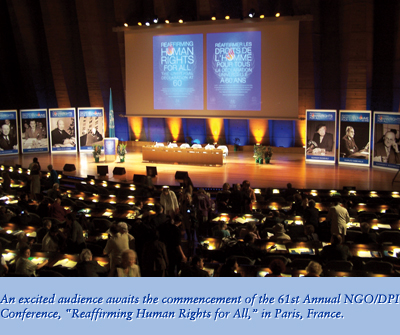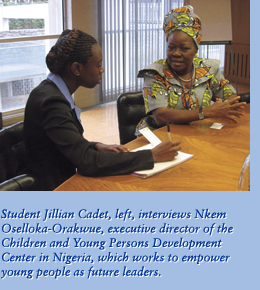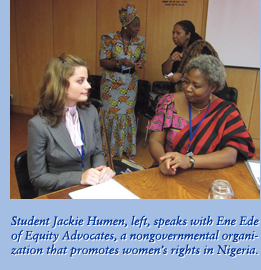


Focusing on Human Rights
This year’s NGO/DPI conference, titled “Reaffirming Human Rights for All: The Universal Declaration at 60,” celebrated the anniversary of the adoption of the Universal Declaration of Human Rights. It was also the first time the conference took place outside the United Nations Headquarters in New York City. Murphy and Jason Scorza, associate provost for global learning and associate professor of philosophy and political science, accompanied Cadet and Humen.
“This conference was especially important given its focus on human rights, which is one of the three main areas for FDU’s U.N. programming and an area in which we have been building a strong track record,” Murphy elaborates.
Scorza welcomed the opportunity to be part of what he says “represents the best of what the global civil society — complex intersecting and overlapping organizations and associations that work tirelessly to address the health, environmental, economic and security challenges facing the world — has to offer. The conference brought together delegates and representatives of organizations [from about 90 countries] working locally, regionally and globally to advance the defense of human rights, to share information and best practices, as well as create partnerships and alliances.”
Both Cadet and Humen have attended other U.N.-related activities at U.N. Headquarters in New York. In the spring of 2008, Humen attended an NGO briefing on indigenous people and toured the headquarters building. And in July 2008, Cadet, who worked with Murphy as a global learning summer U.N. intern, attended the screening of a documentary on the International Day of Peace and a panel discussion about human rights in the age of counterterrorism. “Attending a U.N. conference opens your eyes to new cultures, customs and peoples,” Humen says.

For the first time at the NGO/DPI conference, the customary roundtable discussions were followed by breakout sessions, which allowed participants a greater opportunity for the exchange of ideas in smaller, more personal groups.
For Humen, attending a workshop on women’s rights had the greatest impact. “I met a woman who was a child bride at 14, and she explained to me how common that is in Nigeria and how so many men and women accept it,” she relates. “Another woman spoke of how women are denied medical care in her country. Realizing that situations this serious are commonplace in other countries, and are based on nothing more than gender, is appalling to me.”
For Cadet, it was the statement “Business ethics is human rights” that struck her. “Social entrepreneurship articulates finding the balance between profit and the social environment,” she explains. “We need to be able to identify a set of conflicts as well as solutions. We need to find new answers, invent new structures and networks, work together and find new human rights.”

The students also had the unique opportunity to interview some of the conference delegates, who, Cadet says, “helped put a face to the thousands of representatives who attend these conferences, put a face on human-rights issues and gave global exposure to the motives and inspirations of these representatives.” According to Murphy, these interviews, which were granted only to the FDU students, were designed to give students experience in communicating with human-rights activists from diverse countries as part of their education in global citizenship. “This is a requirement of our U.N. Pathways Program to ensure that students bring back the maximum benefit from any U.N. experience, particularly global conferences, to share with their peers and interested students from all over the world who visit the Office of Global Learning’s Web pages [http://www.fdu.edu/globalexperience],” Murphy adds.
Among the delegates the students interviewed were Shamina de Gonzaga, assistant to the president of the General Assembly and conference chairperson; Nkem Oselloka-Orakwue, executive director of the Children and Young Persons Development Centre in Nigeria; and Ideka Christiana Ngozi, a nun from the Congregation of Daughters of Mary Mother of Mercy who is involved with UNANIMA International. “It was quite a privilege for our students to get these interviews,” says Murphy. “It also spoke highly of the students’ effectiveness in networking and communicating with high-level U.N. and NGO representatives at the conference.”

The fact that the conference was held abroad made the trip a richer educational experience. “The conference was only three days long, but it was not the only place where learning occurred,” Humen says. “My experiences — such as facing a language barrier and realizing that regular activities such as walking around with your coffee may not be acceptable elsewhere — resulted from immersing myself in an unfamiliar culture. And situations such as these drove home the importance of having a global mindset and appreciating cultural differences.”
Being in Paris was also exciting for Cadet, who says, “It exposed me to some of the finest cuisine and artwork. Since this was also very new to me, at times it was overwhelming; but it was uplifting and magnificent.”
Outside of the conference, Cadet and Humen visited some of France’s most famous landmarks — the Eiffel Tower, Notre Dame, Musée d’Orsay, Napoleon’s Tomb, Invalides, the Champs-Élysées, the Arc de Triomphe, Versailles and Montparnasse. Humen says, “It was the kind of education that cannot be taught through a book or even a class. It was a life experience that will continue to impact me long after the trip.”
The experience left Cadet with a greater appreciation for the diverse opportunities for learning that FDU offers its students. “Students should take advantage of all the resources available for traveling abroad. Do not let money, checklists or even the possibility of homesickness hinder you from searching for new opportunities,” she recommends. “Think of it as a trip for your personal development to find yourself and how you relate to the world.”

FDU Magazine Home | Table of Contents | FDU Home | MyFDU.net | Blog About It
©Copyright 2009 Fairleigh Dickinson University. All rights reserved.
For a print copy of FDU Magazine, featuring this and other stories, contact Rebecca Maxon, editor,
201-692-7024 or maxon@fdu.edu.